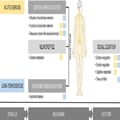Abstract and Introduction
Abstract
Specific nervous system functions and the regulating roles of oxytocin have evolved because of the necessity to negotiate increasingly complex social systems. We hypothesize that acute and long-term physical activity and exercise have the potential to benefit social cognitive abilities, such as emotion recognition and regulation, by operating on these functions.
Introduction
An evolutionary perspective suggests that the large size of the human brain (relative to other species) is mainly attributable to the necessity to cope with complex social systems.[1] When faced with multiple threats and limited resources, the negotiation of social contracts was a key to survival. Such contracts can be understood as a set of rules that govern interactions within and between groups. Social cognitive abilities are required to understand and follow these rules. They further allow the identification of characters that may potentially be harmful for oneself or the group from a set of social cues.[2] This applies to "fair-weather friends" (stay committed as long as we do not need real help, and who abandon us when we are most in need of support), "cheaters" (individuals breaking rules of social contracts), "free riders" (seek benefit without incurring personal costs), and "defectors" (individuals who benefit from the group's performance but leave the group as soon as they should increase their personal costs). As social contracts are a fundamental component of modern societies, social goals determine a large proportion of our everyday behavior. The domain of social cognition summarizes neuropsychological functions that support the planning and achievement of these goals, and distinct functions encompass the recognition of emotions (from visual or auditory features), the regulation of emotions, Theory of Mind (i.e., predict actions based on other individuals' beliefs and desires), and mirroring (i.e., empathize with other individuals' emotions by motor resonance).[3] These functions have a predictive value for many aspects of life including academic achievement,[4] relationships with peers,[5] and career success.[6] Social cognition also is associated with mental health, given that general impairments in this domain and difficulties in socioemotional processing are transdiagnostic outcomes of mental (e.g., major depressive disorder, bipolar disorder), developmental (e.g., attention deficit hyperactivity disorder, autism disorder) and neurological disorders (e.g., Alzheimer disease, Parkinson disease).[7,8]
Beyond physical health, physical activity and exercise have known benefits for mental health across different age groups. The promotion of cognitive resources is one of many ways by which the engagement in these behaviors may influence mental health. In this respect, meta-analytical findings suggest that acute and long-term exercise elicit improvements in cognitive domains spanning attention (i.e., active processing of specific information), memory (i.e., encoding, consolidation, and retrieval of information), and executive function (i.e., top-down control of behavior).[9,10] In contrast, the potential of physical activity and exercise to benefit social cognition has been overlooked so far. Instead, their association traditionally has been investigated from a different perspective. Models that build on social cognition have been used to predict and understand the engagement in and adherence to physical activity across healthy and clinical populations.[11] Further pursuing this line of research, the role of personality traits linked with social cognition (e.g., extraversion, which is characterized by seeking social interactions) for understanding interindividual differences in physical activity and sport preferences[12] also has received much attention in the last decade. This may be because of the fact that from a clinical perspective, social cognition mainly was attributed to personality. However, the actual guidelines for classifying neurocognitive deficits (part of Diagnostic and Statistical Manual of Mental Disorders, 5th edition) recognizes social cognition as a separate cognitive domain alongside executive function, complex attention, perceptual-motor function, language, learning, and memory.[3] This also indicates a higher sensitivity of social cognition for changes given that cognitive abilities are interpreted as being more dynamic and adaptive than personality. Consequently, it may no longer be accurate to only focus on the predictive role of social cognition and related aspects for physical activity and exercise.
Giving rise to a reversed perspective, our review investigates the novel hypothesis that engagement in physical activity and exercise elicits changes in social cognitive abilities, especially the recognition and regulation of emotions, as well as Theory of Mind. Based on neurobiological models that take evolutionary influences into account, we highlight features of the (autonomous and central) nervous system and modulating influences of neuropeptides that determine social cognition but at the same time share a sensitivity to acute and regular physical activity and exercise (Figure 1). We further support our novel hypothesis by reviewing the recent literature that investigated the association of these behaviors or its correlates (i.e., aspects of physical fitness) and specific aspects of social cognition.
Figure 1.
Proposed pathways by which physical activity and exercise promote social cognition. Acute and regular engagement in these interventions may promote social cognition by a facilitation of both shared and distinct pathways to social cognition. Whereas both paradigms seem to promote central nervous system functions, different effects are suggested for the neuropeptide oxytocin and the autonomous nervous system function. Notes: Based on the current evidence, the squares indicate which physical activity and exercise paradigm has been associated with the mechanism and outcome.
Exerc Sport Sci Rev. 2022;50(4):203-212. © 2022 American College of Sports Medicine








